Donald Trump's 'beautiful' wall both a dream and nightmare
- Published
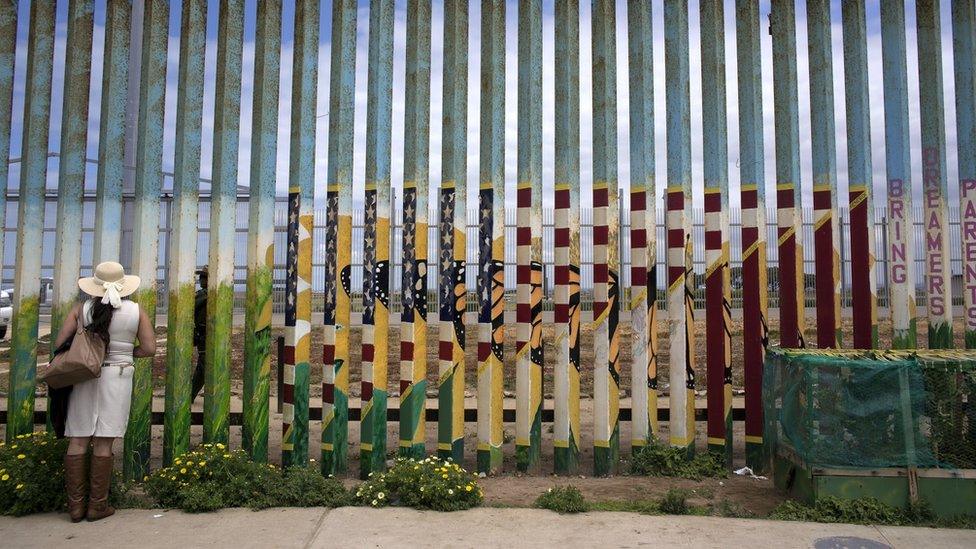
A woman talks to her daughters through the fence, nine years after separation
At the south-western tip of California, straddling the dirty trickle that is the Tijuana river, stands a wall - or rather a series of walls, fences and ditches.
This is the stuff of Donald Trump's dreams, only his wall would be bigger and better of course, not to mention longer, stronger and vastly more expensive.
Between the fortifications, in what is effectively no-man's land, a yellow line painted on the concrete marks the end of the mainland United States and the beginning of Mexico.
The border here owes its defences to Operation Gatekeeper, a controversial programme enacted in 1994 under President Bill Clinton which built barriers, added patrols and spruced up technology such as movement sensors.
All these years on, it appears to have worked, up to a point.
"It's like water," says border agent Shawn Moran as he drives the route near San Diego which he has patrolled for two decades. "They're going to take the path of least resistance and right now there's a lot of resistance out here."
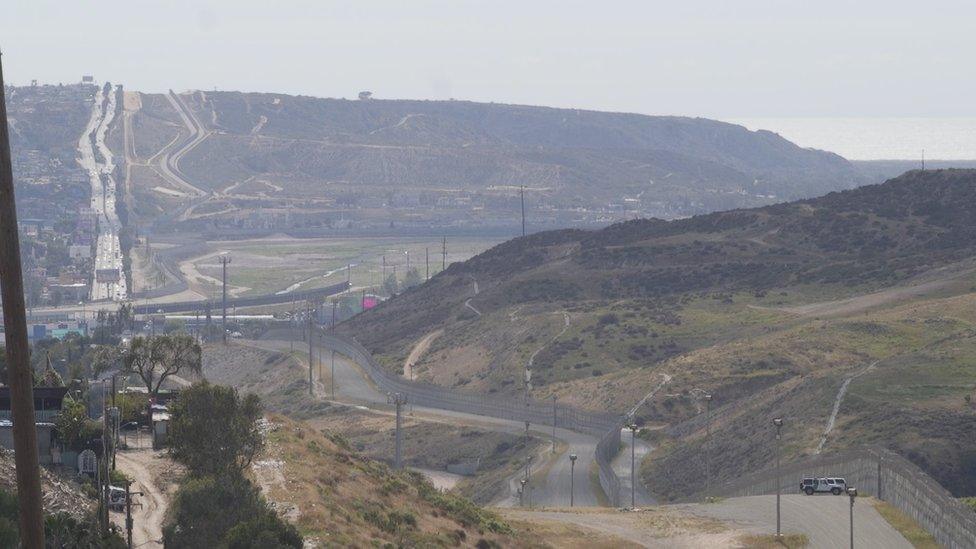
A view from the divide - Mexico on the left, California on the right
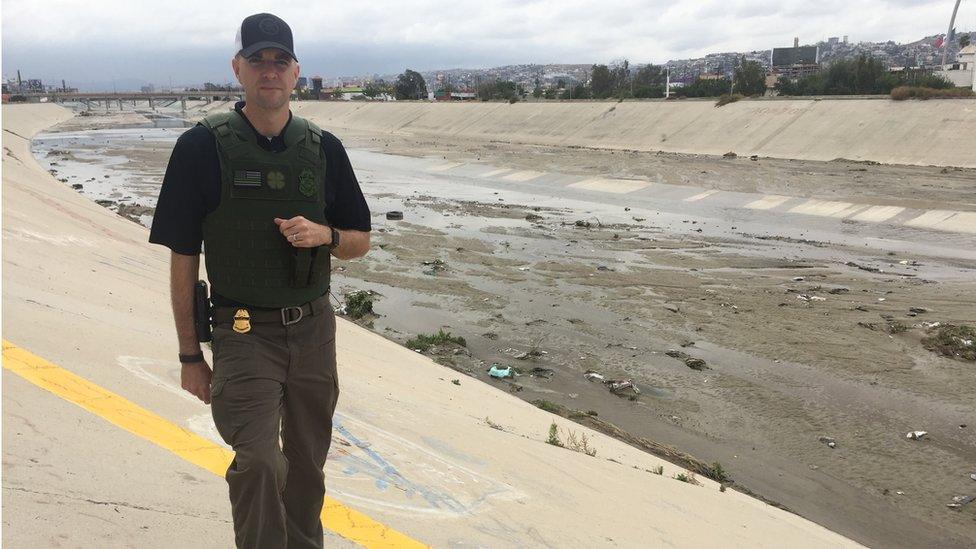
Border patrol officer Shawn Moran supports Trump for his stance on immigration
Elsewhere the frontier looks very different. In Arizona, New Mexico and Texas, says Mr Moran, "you still have wide open areas of wilderness and desert where people are able to get across".
That is if they don't die trying, external.
Donald Trump reckons he has the answer - a "beautiful" wall spanning all four states which abut Mexico. It is a plan which goes down well with the men and women on the front line.
'I lost my family over a broken tail-light'
As vice president of the National Border Patrol Council, Mr Moran is union spokesman for 17,000 border agents who are, collectively, supporting the presumptive Republican nominee for president of the United States.
"Mr Trump seems to be the only candidate that's actually talking about border enforcement and fixing the immigration laws of the United States," says Mr Moran.
"This is a country built on the rule of law and over the past few decades we have carved out entire sections of our immigration laws and just ignored them. President Obama has just thrown out enforcement."
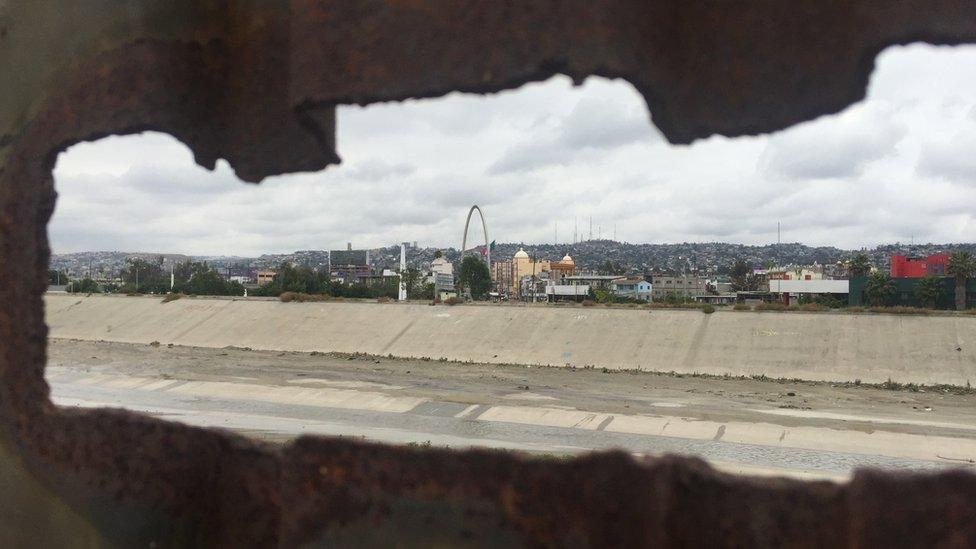
Tijuana, Mexico, as seen from the US side of the border fortification
It is certainly true that the United States has looked the other way for many years as millions of illegal migrants set up home, although the question of enforcement is complex.
Any Mexican you ask in California will tell you they are there to work - often as builders, nannies, farmhands and cleaners, propping up the American economy, they say.
Mr Trump, in contrast, accuses immigrants of costing the US billions of dollars in education, healthcare, housing and welfare as well as of committing crimes and putting Americans out of work.


It is this potent mix of nationalism and protectionism which is animating his supporters in this angriest of elections.
And so Mr Trump wants to throw out every single undocumented immigrant. They would later be allowed to reapply for legal entry, he says, as long as they paid a hefty fee.
It is, by definition, difficult to count people living in the shadows and the numbers are therefore contested, but research estimated the number of unauthorised immigrants inside the United States in 2014, from all countries, at 11.3 million, external.
Exactly how they would be expelled and how much it would cost is, as with so much of Mr Trump's policy platform, not at all clear.
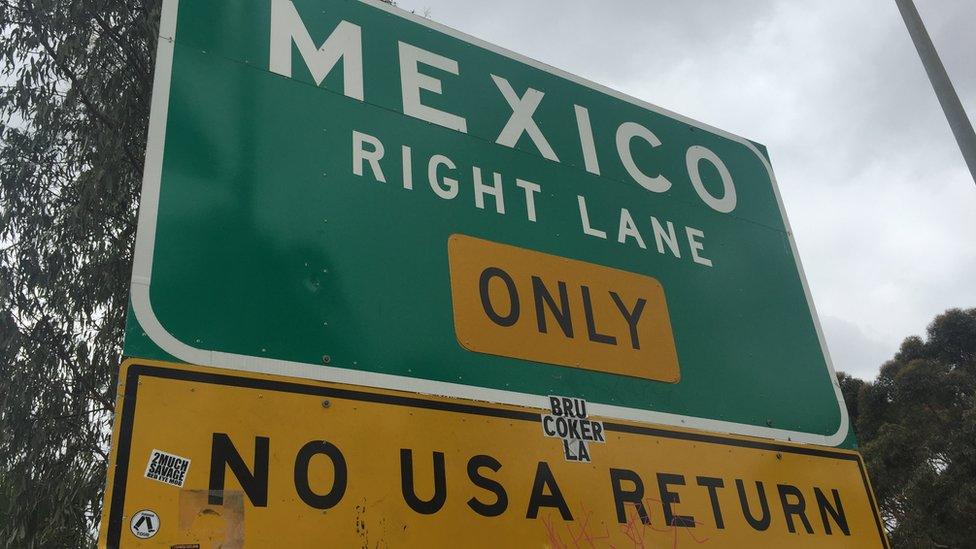
The tycoon-turned-politician has though given a sliver of detail about the "beautiful" wall he says he would build along the 1,989 mile border, external.
Mexico, he says, would pay for its construction or else Mexicans in the US would be prevented from sending money back to their families.
A Trump White House would "impound all remittance payments derived from illegal wages," according to the presidential contender's website, external.
That is no small threat - remittances from all Mexicans abroad were worth $24.8bn in 2015 according to the Bank of Mexico, external, more than the country's oil revenues - but could it be done?
"Is Trump going to steal the money," asks the former president of Mexico, Vicente Fox Quesada, incredulously. "How can any human being think like that? It's incredible!
"It's not going to happen," he tells the BBC. "Forget it. We're not going to pay for that [expletive] wall!"

This sentiment is echoed in Tijuana itself, often in similarly robust language.
Mr Trump's description of Mexican immigrants as killers and rapists hasn't done much for his popularity here - an ugly mural with the caption "Rape Trump" adorns the border wall on the southern side - and in the colourful markets where Trump piñatas, external (papier mache effigies filled with sweets which children whack open at birthday parties) are selling like hot tacos, they have a wary eye on the superpower nextdoor.
Beating the American businessman with a stick is popular, it seems.
"People are worried by everything he's saying about Mexico and Mexicans," says Carmen Espinoza, in Spanish, behind the counter of her shop which has just one Trump piñata left.
"We're not criminals, we're nothing like that. We are hardworking people who simply want to find work. Don't vote for him!"
'It's rough being separated from family'
Of course some Mexican immigrants are criminals and in the past few years many have faced deportation from the US.
In fact, President Barack Obama has reportedly deported more, external illegal immigrants than any president before him, although critics say that number has fallen sharply, external during his second term.
As a result, across Tijuana we find what could be the scene from another Donald Trump dream - a room full of freshly deported "illegals".
In this half-way house for new arrivals - the Casa del Migrante, a Christian mission which offers shelter, legal advice and psychological support - they're serving dinner.
For some of the men and women here this is the first real taste of Mexico since they were children.
Victor Manuel Perez Monroi, who lived in Spokane, Washington, from the ages of six to 61, is typical. After 55 years in the US he was expelled, he says, after being stopped at a traffic light, because his papers were not in order.
"It was very hard for me," says Mr Perez whose son was shot and killed in Texas six months ago. "I can't visit his grave because I can't cross the border."
Mr Perez argues that there would be two consequences of an attempt to deport 11m people from the US - a potential uprising "if the families will gather up like the blacks did" and an economic collapse.
"You guys are going to have to work on the fields," he says, arguing that the hard labour in the US is all done by Latinos. "Blacks don't want to do it, whites don't want to do it.
"The economy would go down. They would go bankrupt."
Mr Perez is not the only one here struggling with his new life. Other migrants tell similar stories of infractions, minor and major, which resulted in their deportation and, often, in the potential of permanent separation from their families.
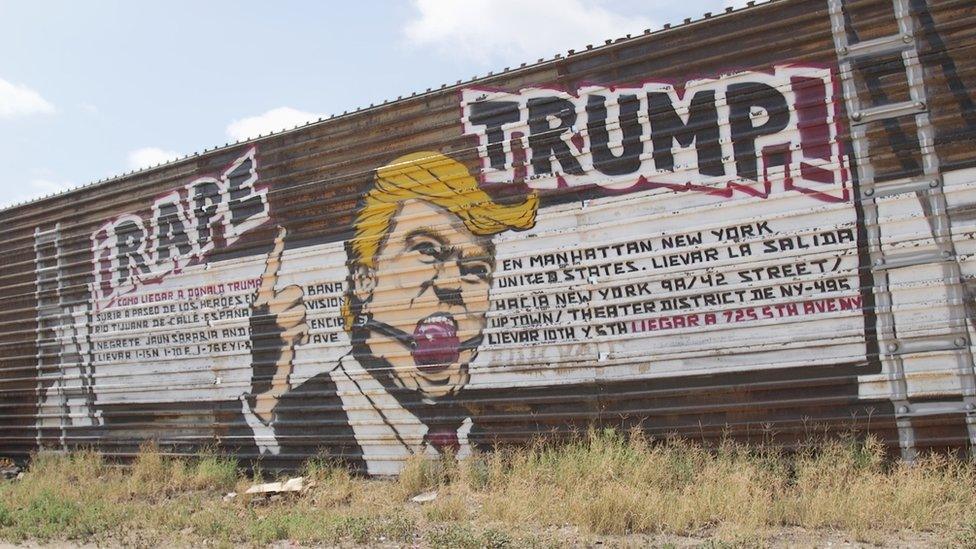
Looking across at Tijuana from the US side, is the border patrol agent Shawn Moran sympathetic?
"Oh, yes," he insists. "If I was in the same situation, I would try to get my family out of there and go somewhere where I could make some money and give them a better way to live.
"But we have a system in place for that. I am not against immigration at all. I'm for legal immigration. I'm against illegal immigration."
It is this simple defence of the laws of the United States which encapsulates why many Americans have turned to Trump - but it also explains why, for many Mexicans, the prospect of his winning the White House would be their worst nightmare.